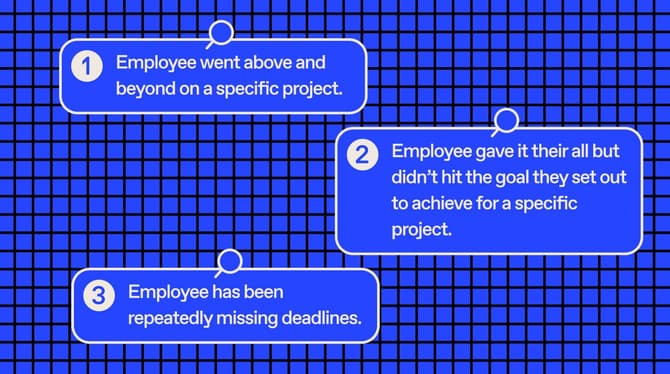Onboarding a new manager is similar to onboarding any new employee: there is planning and preparation involved, a lot of knowledge transfer regarding the organization and their role, colleague introductions, regular touch bases, and progress reviews. A standard, comprehensive onboarding checklist can apply just as much to onboarding a new manager.
That said, there are some key differences to consider when building an onboarding plan for new managers, which can impact the effectiveness of your onboarding efforts. This article lists onboarding items specifically designed for new managers.
Something extra for your new manager
Maybe you've promoted an existing employee to a manager position, or you're hiring a new manager externally. New managers: The complete guide is a must-have addition to the onboarding process.
Exclusive online summit
·
May 23 2024
Moments that matter: how to seed great work
What's in this article
- ☑ Plan activities and meetings ahead
- ☑ Brief new managers on their team
- ☑ Involve the right people
- ☑ Give a comprehensive company overview
- ☑ Give a thorough walk-through of company policies
- ☑ Set clear expectations and milestones
- ☑ Schedule routine training
- ☑ Schedule regular touch bases
- Key takeaways for onboarding new managers
☑ Plan activities and meetings ahead
Planning is a non-negotiable for any strong onboarding plan. Onboarding a new manager doesn't necessarily make the planning process more robust, but you may have to prepare for particular considerations unique to a managerial role. Whether you're onboarding a new hire or cross-boarding someone internally, new managers should be well-versed in the team they will manage, the management team they'll belong to, and the person they'll be reporting to. And so you might want to:
- Plan specific activities and meetings according to groups or departments
- Prepare different resources either for knowledge sharing or regarding contract agreements
- Brief new managers one-on-one about particular topics before their start date
It's too easy to skip or miss a crucial step—like sending non-disclosure agreements—if you're ill-prepared or short on time. That's where onboarding tools like Workleap Onboarding can help. Ready-made templates help you cover the basics and schedule everything on a timeline in a clean, easy-to-navigate platform.
☑ Brief new managers on their team
The role of a manager involves many responsibilities, one of them being to lead a team of employees. There are a lot of people management skills necessary for managers to hone, from having good communication to empathy to the ability to adapt.
The goal for new managers is to quickly familiarize themselves with their team and its members to put those management skills to good use. It's important to properly brief new managers on expectations, including existing team dynamics and issues. Such a brief can involve:
- Description of each team member, their roles and responsibilities
- Performance highlights of team and members
- Colleague dynamics, such as who works best with whom
- Challenges and objectives, historically or current
- Strengths and weaknesses to consider
☑ Involve the right people
When planning an onboarding, involving other people can fall in either of two ways: delegate some of the onboarding tasks to a better-suited individual (such as having a software expert give a tutorial on a program) or reserving time for one-on-one meetings.
For the latter, avoid delaying opportunities for new managers to meet their colleagues, especially because they embody a liaison role for so many people. Introduction meetings planned in a new manager's onboarding should include:
- Direct supervisor(s)
- Other managers
- Their team members
- Go-to HR contact(s)
A shared platform like Workleap Onboarding allows you to automatically assign activities to other colleagues and delegate parts of the planning to others. You can also schedule meetings between new managers and colleagues ahead of time directly through the app. This way, nobody forgets to meet for a proper one-on-one in those first, crucial weeks.
☑ Give a comprehensive company overview
Being in a leadership position in the eyes of their team, managers are essentially representatives of the organization. Their knowledge, professionalism, and managerial actions reflect onto the company. Hence, new managers need to grasp and adopt the company culture and values and emulate that in their management style. New manager orientation should cover the following topics in-depth:
- Company history
- Leadership team and structure
- Corporate vision and goals
- Company culture as a whole
- Company management culture
Know the difference:
Company culture (or corporate culture) refers to an organization's collective shared values and behaviors and its employees. This is important for all new employees to know about.
Company management culture refers to how those values and behaviors get translated through management and leadership actions. This is especially important for new managers to know about.
☑ Give a thorough walk-through of company policies
Because managers act as gatekeepers of company culture and policies, new managers should get familiarized with all procedures and guidelines. Thoroughness is key: provide them with comprehensive resources and reading materials, and ensure your new manager has a go-to HR contact in case of questions or concerns. Policies differ from company to company, but they could include:
- Leave policy
- Security policy
- Remote work policy
- Confidentiality policy
- Internal mobility policy
- Recruitment policy
- HR policies (such as reporting misconduct)
- Rewards and recognition (like bonus schemes)
☑ Set clear expectations and milestones
All new employees need to understand the expectations attributed to their role to know how to do their job well. Expectations need to be clear and set on a timeline (i.e., monthly or quarterly milestones). For your new managers, this can pertain to:
- Budget and timelines for deliverables
- Team performance (collective or individual)
- Management performance (team engagement, turnover, feedback)
☑ Schedule routine training
New or senior, all managers should participate in regular management training—even if just for maintenance. In certain industries, this could be mandatory. It's essential to cultivate leadership abilities and ensure your new manager's training is up to date. Train managers on things like:
- Leadership or employee motivation training
- Communication training (like Nonviolent Communication NVC)
- Conflict management or crisis management
- Time management or budget management
- Team management
- Inclusion, equity, and bias courses
☑ Schedule regular touch bases
Regularly checking in with all new employees is a key element throughout the onboarding process (which usually lasts the entire first year of employment). Be it informal check-ins or more formal 30/60/90 day check-ins, new managers should regularly connect with:
- Their supervisor to measure the progress of their onboarding, and
- An HR supervisor to clarify any questions and ensure that they're on track with adopting policies and in-the-know with any changes.
📝 Plan for an effective 30-day check-in with your new manager with The 10 best questions to ask new hires after their first 30 days.
Key takeaways for onboarding new managers
In a lot of ways, new managers are just like new employees. They are people, and they will onboard faster, be more loyal to their new company, and be more engaged if they have great onboarding. if they feel their onboarding plan has been personalized for them. Effective onboarding pays off: companies who invest in onboarding benefit from higher retention and productivity. There's your proof to get it right every time, and for everyone!
That said, a new manager's responsibilities are different. And, as new managers are, in effect, a representative of the organization for other employees, the importance of how well they absorb, retain, and apply knowledge through their onboarding holds much more weight.
Softstart: Your new onboarding secret weapon
A tool like Workleap Onboarding will help you plan, involve others and measure the progress of your new manager's onboarding experience faster, better, and simpler. Try it for free today and discover a library of templates ready for you to customize and use.



